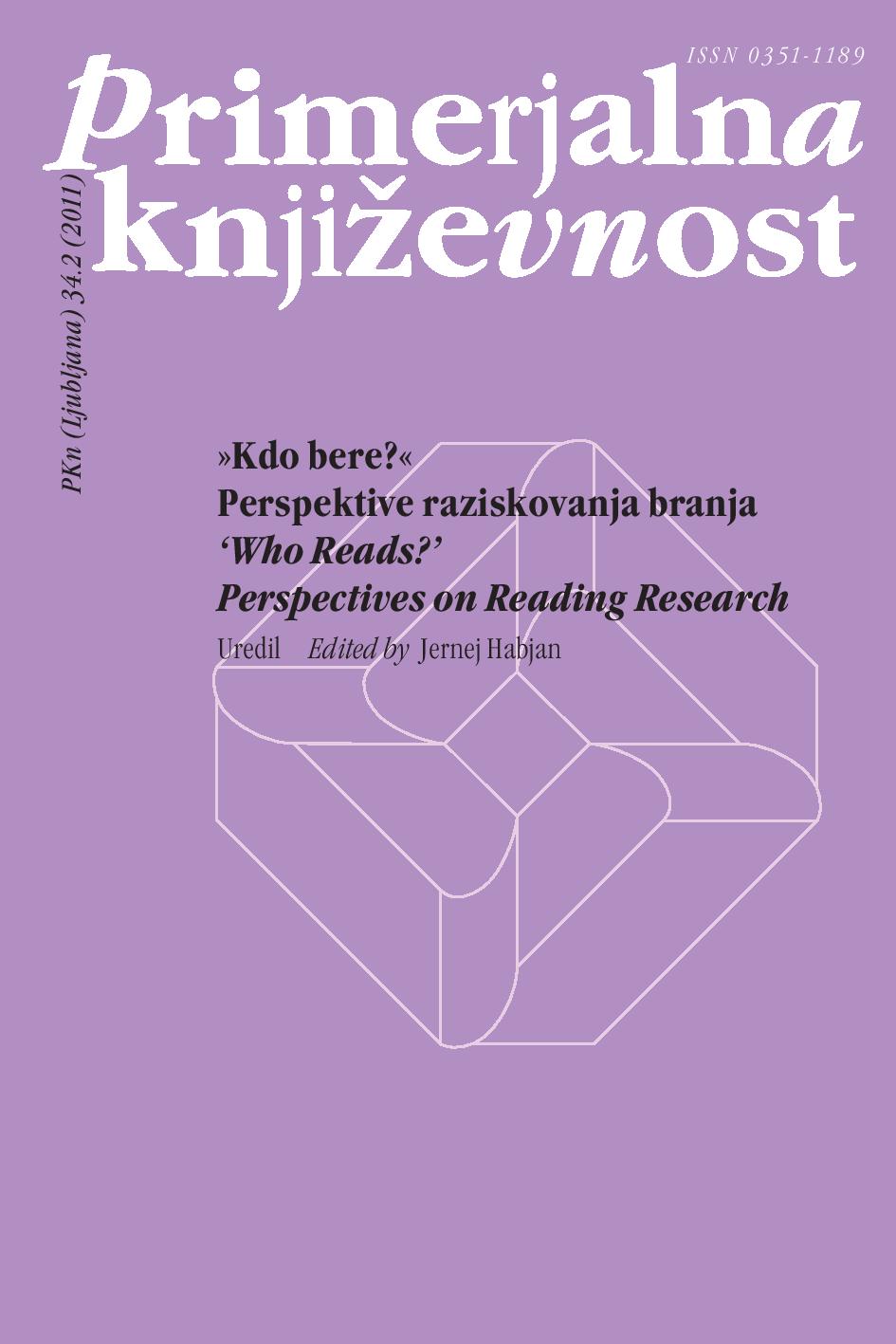Readers and Reading as Interaction with Literary Texts
Keywords:
reading, readers, reception theory, literary experience, interaction, digital literatureAbstract
The concept of reading as the interaction between the reader and the text makes it possible to examine some less studied dimensions of the reading process and the literary experience. It centres attention on what the readers do when they actually read and on their own contribution to the mental representation of the text. Such a concept also helps to understand the reader’s interaction with the electronic texts.References
Abercrombie, Lascelles. An Essay Towards a Theory of Art. London: Martin Secker, 1922.
– – –. Principles of Literary Criticism. London: Victor Gollancz, 1932.
Bolter, Jay David. Writing Space. Computers, Hypertexts, and the Remediation of Print. Mahwah (NJ): Lawrence Erlbaum, 2001 (1. izd.: 1991).
Bortolussi, Marisa, in Peter Dixon. Psychonarratology. Foundations for the Empirical Study of Literary Response. Cambridge: Cambridge UP, 2003.
Brooke, Lea, R. »Predicting Propositional Logic Inferences in Text Comprehension«. Journal of Memory and Language 29.3 (1990): 361–387.
Carr, Nicholas. The Shallows. How the Internet Is Changing the Way We Think, Read and Remember. London: Atlantic Books, 2010.
Carroll, Noël. »The Paradox of Suspense«. Suspense. Conceptualization, Theoretical Analyses, and Empirical Exploration. Ur. Peter Vorderer idr. Mahwah (NJ): Lawrence Erlbaum, 1996. 71–91.
– – –. »Art, Narrative and Emotion«. Emotion and the Arts. Ur. Mette Hjort in Sue Laver. Oxford: Oxford UP, 1997. 190–211.
Cruse, Amy. The Shaping of English Literature and the Reader’s Share in Developing Its Form. London: George G. Harrap, 1927.
Drinkwater, John. The Poet and Communication. London: Wats & Co., 1923.
Enkvist, Nils Erik. »On the Interpretability of Texts in General and of Literary Texts in Particular«. Literary Pragmatics. Ed. Roger D. Sell. London: Routledge, 1991. 1–25.
Fish, Stanley. Surprised by Sin: The Reader in Paradise Lost. Berkeley: U of California P, 1971.
Fowler, Roger. Linguistic Criticism. Oxford: Oxford UP, 1996 (1. izd.: 1986).
Gerrig, Richard, J. Experiencing Narrative Worlds. On the Psychological Activities of Reading. New Haven (CT): Yale UP, 1993.
Hayles, Katherine. Electronic Literature. New Horizons for the Literary. Notre Dame (IN): U of Notre Dame P, 2008.
Hunt, Russel, A., in Douglas Vipond. »Evaluation in Literary Reading«. Text 6.1 (1986): 53–71.
Iser, Wolfgang. Bralno dejanje. Prev. Alfred Leskovec. Ljubljana: Studia humanitatis, 2001.
Joyce, Michael. Afternoon, a story. 1987. Watertown (MA): Eastgate Systems, 1990.
Keen, Suzanne. Empathy and the Novel. Oxford: Oxford UP, 2010.
Kintsch, Walter, in Teun A. van Dijk. »Toward a Model of Text Comprehension and Production«. Psychological Review 85 (1978): 363–394.
Kress, Gunther. Literacy in the New Media Age. London: Routledge, 2003.
Landow, George P. Hypertext. The Convergence of Contemporary Critical Theory and Technology. Baltimore: Johns Hopkins UP, 1992.
Lee, Vernon [Paget, Violet]. Handling of Words. London: John Lane, 1923.
Liestol, Gunnar. »Wittgenstein, Genette, and the Reader’s Narrative in Hypertext«. Hyper / Text / Theory. Ur. George P. Landow. Baltimore: Johns Hopkins UP, 1994. 87–120.
Lubbock, Percy. The Craft of Fiction. London: Jonathan Cape, 1921.
Mar, Raymond A., idr. »Emotion and Narrative Fiction: Interactive Influences Before, During, and After Reading«. Cognition & Emotion [pred izidom]. Dostopno na: http://www.yorku.ca/mar/Mar%20et%20al%202010_CogEmo_narratives%20and%20emotion%20review.pdf (21. maj 2011).
Miall, David S., in Don Kuiken. »Aspects of Literary Response: A New Questionaire«. Research in the Teaching of English 29.1 (1995): 37–58.
Reader Response to Literature. The Empirical Dimension. Ur. Elaine F. Nardocchio. Berlin: Mouton de Gruyter, 1992.
Nell, Victor. Lost in a Book. The Psychology of Reading for Pleasure. New Haven (CT): Yale UP, 1988.
Olsen, Stein Haugom. The Structure of Literary Understanding. Cambridge: Cambridge UP, 1978.
Ong, Walter J. Orality and Literacy. London: Routledge, 2002.
Pratt, Mary Louise. Towards a Speech Act Theory of Literary Discourse. Bloomington (IN): Indiana UP, 1978.
Richards, I. A. Practical Criticism. London: Paul Trench & Trubner, 1929.
Richards, I. A. Principles of Literary Criticism. London: Routledge in Kegan Paul, 1924.
Spiro, Rand J. »Prior Knowledge and Story Processing: Integration, Selection, and Variation«. Poetics 9.1–3 (1980): 313–327.
Vipond, Douglas, in Russel A. Hunt. »Point-Driven Understanding: Pragmatic and Cognitive Dimensions of Literary Reading«. Poetics 13.3 (1984): 261–277.
Vorderer, Peter. »Toward a Psychological Theory of Suspense«. Suspense. Conceptualization, Theoretical Analyses, and Empirical Exploration. Ur. Peter Vorderer idr. Mahwah (NJ): Lawrence Erlbaum, 1996. 233–254.
Van Peer, Willie. »Toward a Poetics of Emotion«. Emotion and the Arts. Ur. Mette Hjort in Sue Laver. Oxford: Oxford UP, 1997. 215–224.
Wolf, Marianne. Proust and the Squid. The Story and Science of the Reading Brain. New York: Harper Perennial, 2007.


